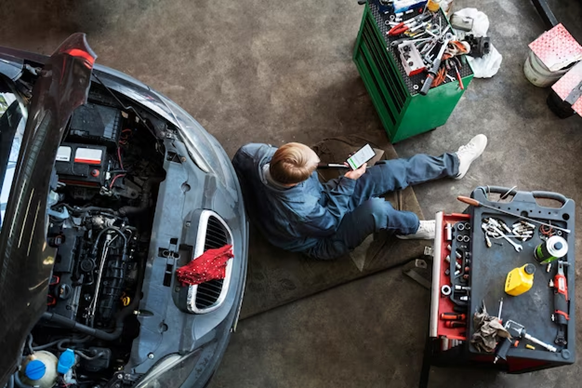Auto Mechanic / Technician
At PHILLY-TECH, students will learn how to repair basic car parts like brakes, steering wheels and engines. Students will learn how to inspect and fix a vehicle’s electrical system and perform automotive care tasks such as checking and changing fluid levels and rotating tires. In mechanical application at PHILLY-TECH students will experience hands-on opportunities to fix or repair parts. In addition, students will learn about the implementation of the new technologies for diagnosis and troubleshooting systems to fix problems.
Our program provides students with the knowledge and skills required to become competent auto mechanics. Students will also receive training in soft skills such as communication, customer service, and teamwork. The curriculum will be regularly updated to keep up with the evolving technology in the automotive industry. Additionally, students are encouraged to stay informed about emerging technologies in the field.

Diploma in Auto Mechanic Technician Program
Trimester 1:
AUTTEC 100: Introduction to Automotive Technology
- Introduction to the automotive industry and its history
- Vehicle types and classifications
- Basic automotive terminology and safety procedures
AUTENG 100: Engine Systems
- Internal combustion engines
- Engine components and systems
- Engine performance and maintenance
AUTCSU 100: Chassis and Suspension
- Vehicle suspension systems
- Steering components and alignment
- Tire maintenance and safety
AUTBWA 100: Brakes and Wheel Alignment
- Brake systems and components
- Brake maintenance and repair
- Wheel alignment principles
AUTTOQ 100: Tools and Equipment
- Introduction to automotive tools and equipment
- Proper tool usage and safety
- Basic tool identification and selection
Trimester 2:
AUTELEC 100: Automotive Electrical and Electronics
- Introduction to electrical systems in vehicles
- Ohm’s law and electrical circuits
- Basic electronic components and troubleshooting
AUTCHAR 100: Starting and Charging Systems
- Understanding starter and alternator systems
- Diagnosis and repair of starting and charging issues
- Battery testing and maintenance
AUTING 100: Ignition Systems
- Ignition system components
- Spark plug and ignition coil maintenance
- Diagnosing and repairing ignition problems
AUTFUEL 100: Fuel Systems
- Fuel delivery systems in vehicles
- Fuel injection systems
- Diagnosis and repair of fuel-related issues
Trimester 3:
AUTADV 1002: Advanced Automotive Systems
- Automatic and manual transmissions
- Clutch and drivetrain components
- Transmission maintenance and repair
AUTHVAC 100: Heating, Ventilation, and Air Conditioning (HVAC)
- HVAC systems and components
- A/C refrigerant handling and charging
- Diagnosis and repair of HVAC issues
AUTENG 101: Engine Performance
- Advanced engine diagnostics
- Performance tuning and upgrades
- Emission control systems
AUTGNO 100: Automotive Diagnostics
- Using diagnostic tools and software
- Troubleshooting complex automotive problems
- Data logging and analysis
Trimester 4: Practical Training and Internship
AUTJOB 100: Practical Application and Internship
- Hands-on experience in diagnosing and repairing vehicles
- Practical exercises in a controlled workshop environment
- Placement in an automotive service center
- Gaining real-world experience in repairing and maintaining vehicles
- Supervised by experienced professionals
AUTFIN 100: Final Assessment and Certification
- Evaluation of the student’s performance during the internship
Students have to contact the school administration if they want to take extra credits or transfer credits to pursue the Diploma Certificate or Associate of Applied Science (A.A.S.) Degree in their field of interest. Students will select required number courses in each of the areas listed to meet general education requirements graduation for the A.A.S. Some of these courses can be transferred directly from and to the university system and may be substituted for recommended courses on the outline. Students should speak with an advisor before doing so these selective courses are required for all students.
- Selected Communication Course (Choose two for Diploma or three for the Associate)
ENGL 100: Fundamentals of Speech
CPL 100: Career Planning
CPL 101: Communications and Career Strategies
ENGL 101: Composition
ENGL 102: composition
- Selected Mathematics Course (Choose two for Diploma or three for the Associate)
MATH 100:General Math
MATH 101:Intermediate Algebra
MATH 102:College Algebra
- Selected Social Science Course (Choose two for Diploma or four for the Associate)
ECON 105:Leadership
ECON 101:Principles of Microeconomics I
ECON 102:Principles of Macroeconomics II
SOC 101:Introduction to Sociology
PSYC 101: Introduction to Psychology
HIST 101: History
